牛津译林版(2019)必修第一册Unit 2 Let's talk teens Welcome to the unit & Reading 课件(共34张PPT)
文档属性
| 名称 | 牛津译林版(2019)必修第一册Unit 2 Let's talk teens Welcome to the unit & Reading 课件(共34张PPT) | 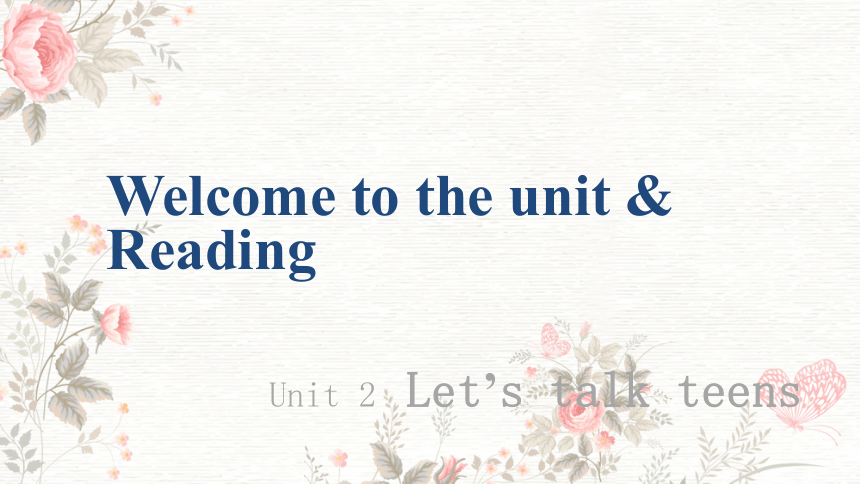 | |
| 格式 | pptx | ||
| 文件大小 | 9.6MB | ||
| 资源类型 | 教案 | ||
| 版本资源 | 牛津译林版(2019) | ||
| 科目 | 英语 | ||
| 更新时间 | 2024-03-27 14:17:29 | ||
图片预览

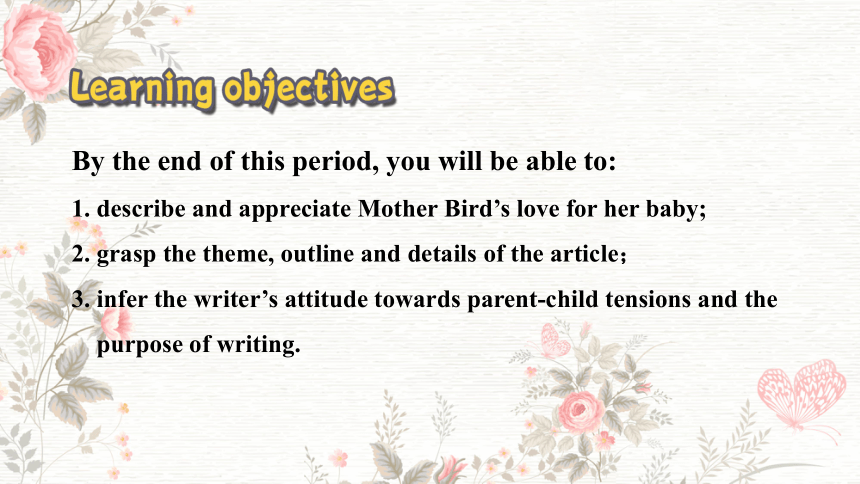
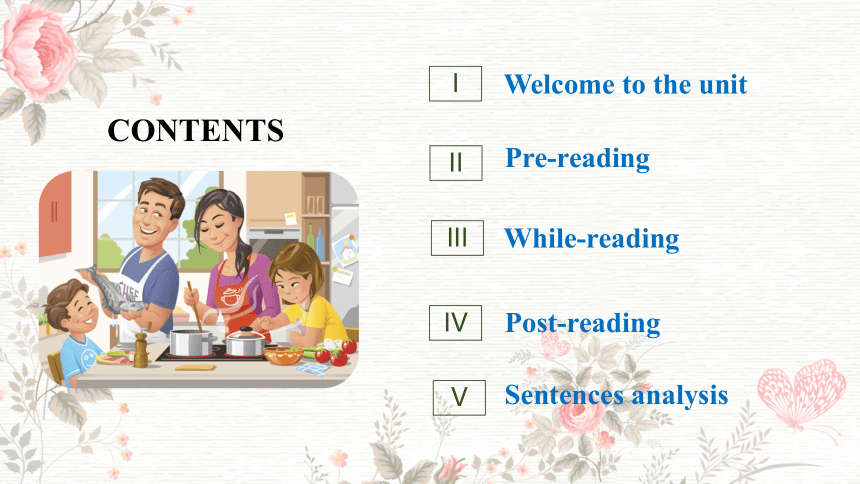
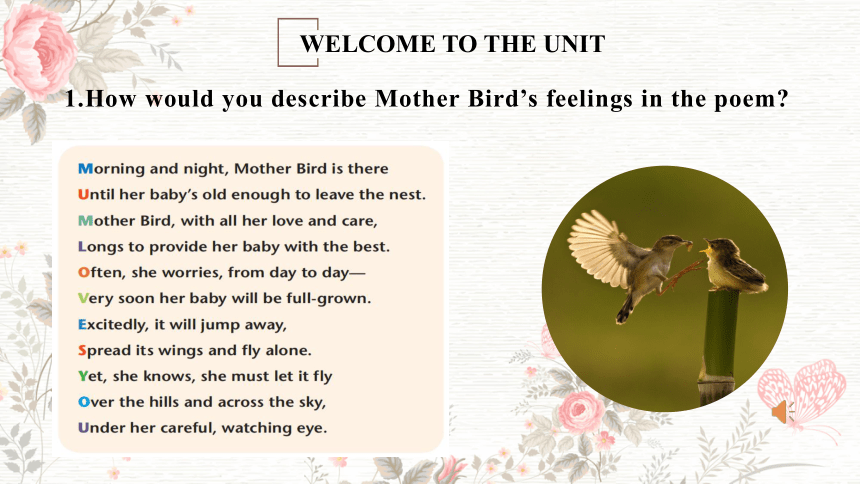
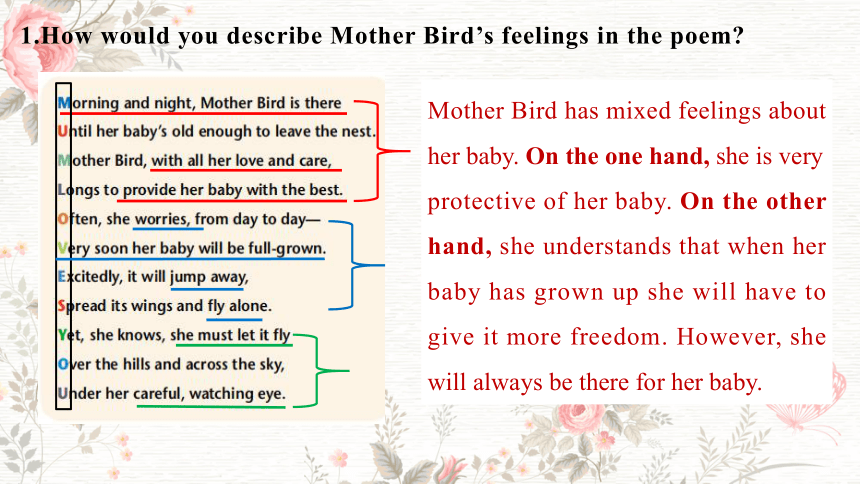
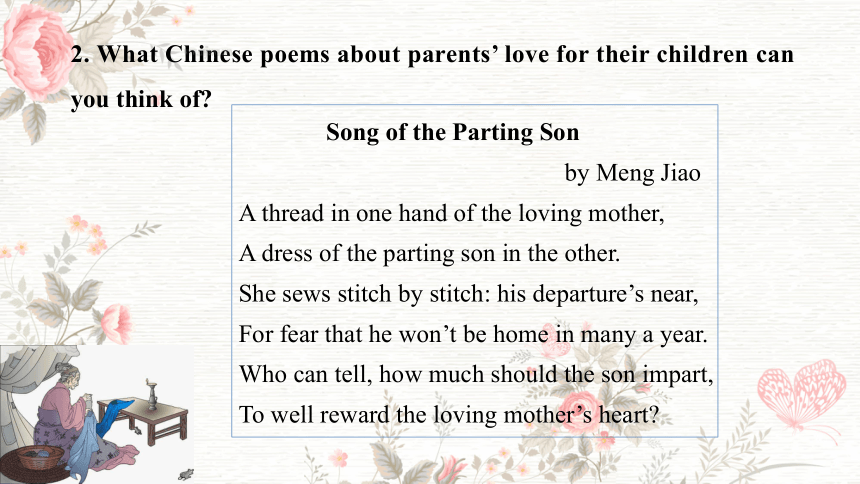
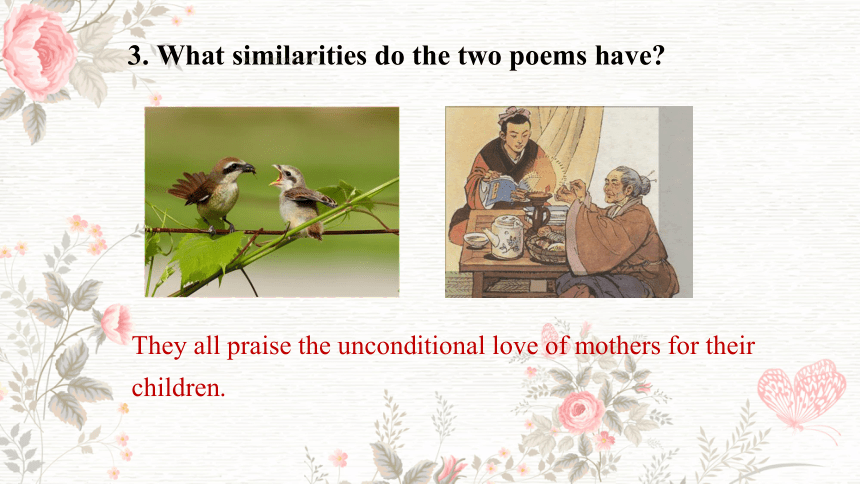
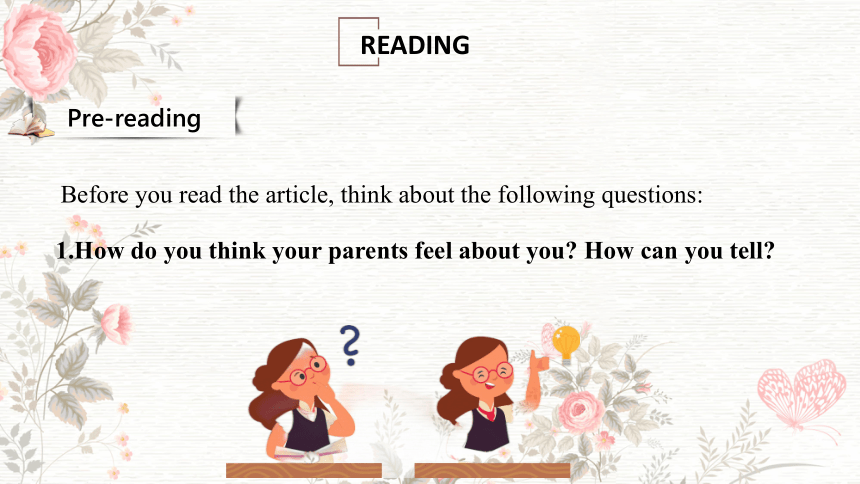
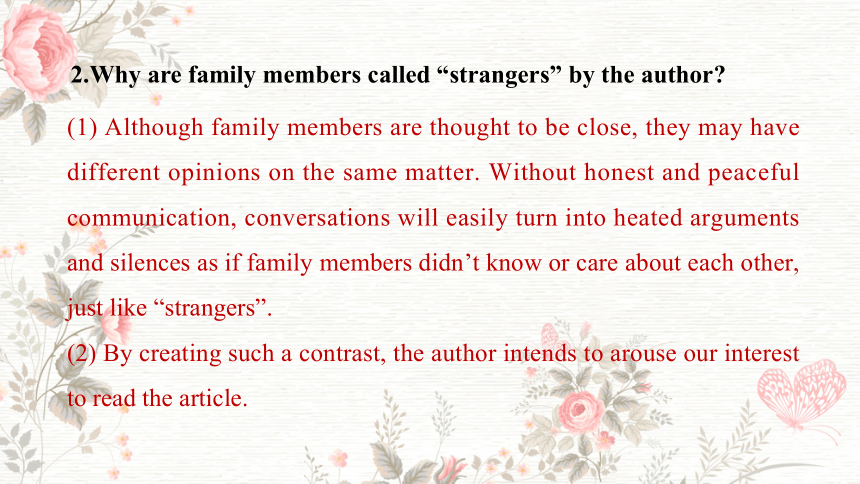
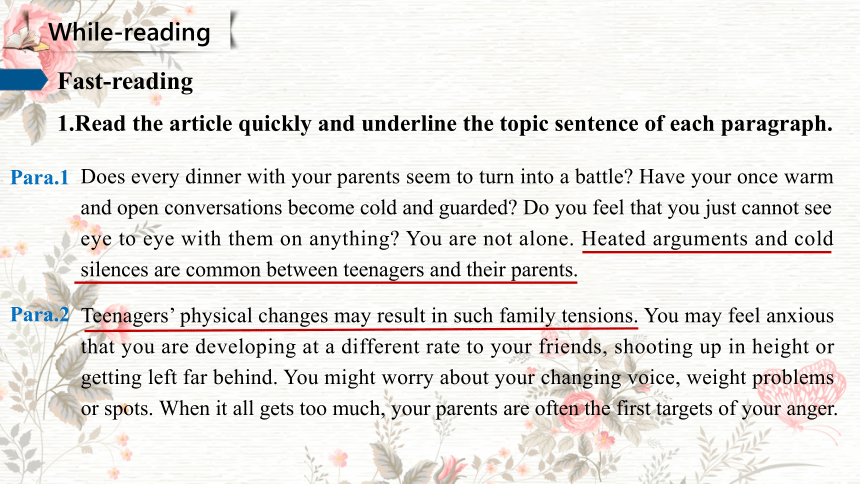
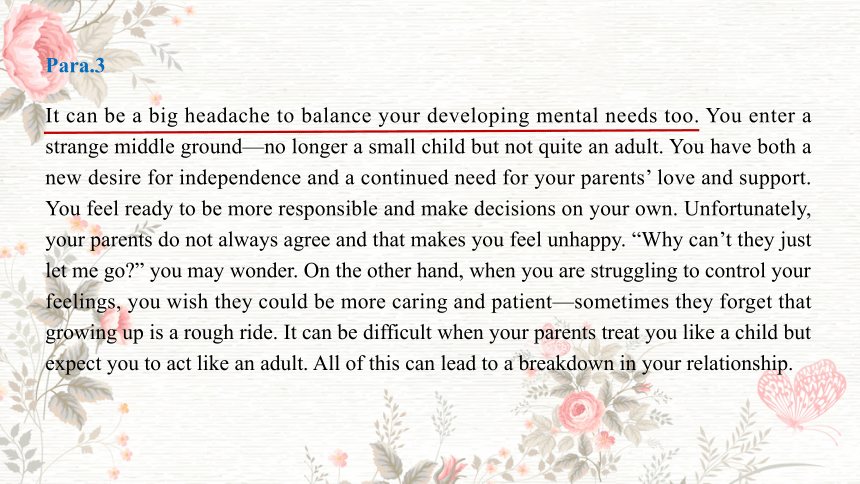
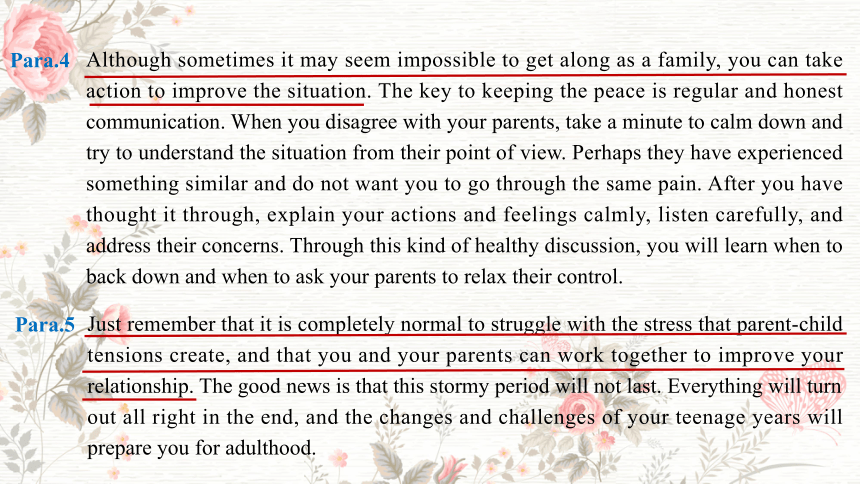
文档简介
(共34张PPT)
Unit 2
Let’s talk teens
Welcome to the unit & Reading
By the end of this period, you will be able to:
1. describe and appreciate Mother Bird’s love for her baby;
2. grasp the theme, outline and details of the article;
3. infer the writer’s attitude towards parent-child tensions and the
purpose of writing.
Pre-reading
I
While-reading
II
Post-reading
III
Sentences analysis
IV
V
Welcome to the unit
CONTENTS
WELCOME TO THE UNIT
1.How would you describe Mother Bird’s feelings in the poem
MUM LOVES YOU
let the baby fly independently
despite her concern
raise the baby with love
worry that the baby will grow up and leave her
Mother Bird has mixed feelings about her baby. On the one hand, she is very protective of her baby. On the other hand, she understands that when her baby has grown up she will have to give it more freedom. However, she will always be there for her baby.
1.How would you describe Mother Bird’s feelings in the poem
2. What Chinese poems about parents’ love for their children can you think of
Song of the Parting Son
by Meng Jiao
A thread in one hand of the loving mother,
A dress of the parting son in the other.
She sews stitch by stitch: his departure’s near,
For fear that he won’t be home in many a year.
Who can tell, how much should the son impart,
To well reward the loving mother’s heart
3. What similarities do the two poems have
They all praise the unconditional love of mothers for their children.
Pre-reading
1.How do you think your parents feel about you How can you tell
READING
Before you read the article, think about the following questions:
(1) Although family members are thought to be close, they may have different opinions on the same matter. Without honest and peaceful communication, conversations will easily turn into heated arguments and silences as if family members didn’t know or care about each other, just like “strangers”.
(2) By creating such a contrast, the author intends to arouse our interest to read the article.
2.Why are family members called “strangers” by the author
Does every dinner with your parents seem to turn into a battle Have your once warm and open conversations become cold and guarded Do you feel that you just cannot see eye to eye with them on anything You are not alone. Heated arguments and cold silences are common between teenagers and their parents.
While-reading
Fast-reading
1.Read the article quickly and underline the topic sentence of each paragraph.
Para.1
Teenagers’ physical changes may result in such family tensions. You may feel anxious that you are developing at a different rate to your friends, shooting up in height or getting left far behind. You might worry about your changing voice, weight problems or spots. When it all gets too much, your parents are often the first targets of your anger.
Para.2
It can be a big headache to balance your developing mental needs too. You enter a strange middle ground—no longer a small child but not quite an adult. You have both a new desire for independence and a continued need for your parents’ love and support. You feel ready to be more responsible and make decisions on your own. Unfortunately, your parents do not always agree and that makes you feel unhappy. “Why can’t they just let me go ” you may wonder. On the other hand, when you are struggling to control your feelings, you wish they could be more caring and patient—sometimes they forget that growing up is a rough ride. It can be difficult when your parents treat you like a child but expect you to act like an adult. All of this can lead to a breakdown in your relationship.
Para.3
Although sometimes it may seem impossible to get along as a family, you can take action to improve the situation. The key to keeping the peace is regular and honest communication. When you disagree with your parents, take a minute to calm down and try to understand the situation from their point of view. Perhaps they have experienced something similar and do not want you to go through the same pain. After you have thought it through, explain your actions and feelings calmly, listen carefully, and address their concerns. Through this kind of healthy discussion, you will learn when to back down and when to ask your parents to relax their control.
Just remember that it is completely normal to struggle with the stress that parent-child tensions create, and that you and your parents can work together to improve your relationship. The good news is that this stormy period will not last. Everything will turn out all right in the end, and the changes and challenges of your teenage years will prepare you for adulthood.
Para.4
Para.5
2. Complete the chart below.
Introduction: Para. (1)______
It is common for teenagers to have difficult
relationships with their parents.
Cause 1: Para. (2)_______
(3)_____________________
Cause 2: Para. (4)_____
(5)________________
Physical changes
Mental needs
Solution:Para. (6)_______
(7)________________________________
Regular and honest communication
Conclusion:Para.(8)______
(9)____________________________________
Everything will turn out all right in the end.
1
4
2
3
5
3.What is the text type of the article
A.Narration(记叙文).
B.Exposition(说明文).
C.Argumentation(议论文).
D. Practical Writing(应用文)
√
1. How does the author introduce the topic of the article
A.By listing numbers.
B.By giving examples.
C.By asking questions.
D.By giving a definition.
Careful-reading
Para.1
√
2. What does “You are not alone.” mean
Arguments and silences are .
common
3.What’s the meaning of “see eye to eye” in “Do you feel that you just cannot see eye to eye with them on anything ”
A. agree B. keep peace C. envy D.conflict
√
1. What does “that” in “that makes you feel unhappy” in Line 19 refer to
Teenagers feel ready to be more responsible and make decisions on their own,but their parents do not always agree.
2. (1)Why does the author use“on the other hand” in Line 20
(2) What are the two kinds of uneasy mental needs that teenagers have
Paras.2-3
By saying this, the author means that teenagers have two kinds of uneasy mental needs.
They have a new desire for independence and a continued need for their parents’ love and support.
A family battle is common between teenagers and parents. Para.2:Physical changes Para.3:Mental needs
Develop ①_______________, ②___________in height or ③___________far behind. A changing ④________. ⑤_________ problems. ⑥_______. A desire for ⑦______________.
A struggle to ⑧_________________.
A continued need for parents’
⑨________ and ⑩___________.
A wish for parents’
________________
3. Fill in the blanks.
at a different rate
shoot up
get left
voice
Weight
Spots
independence
love
support
control feelings
care and patience
middle ground
childhood
adulthood
having a desire for independence
hoping to be treated
like an adult
needing love
& support
being treated like a child
4.What does “middle ground” in Para. 3 mean
The state of being no longer a small child but not quite an adult.
Para.4
1. How can teenagers solve problems with their parents Fill in the blanks.
Regular and honest
①______________
communication
When you disagree with your parents
②_____________and ③___________ from their point of view.
④________ calmly, ⑤_________ carefully and
⑥_________their concerns.
Finally, you will learn when to ⑦_______________and when to ask your parents to ⑧____________________.
Calm down
understand
Explain
listen
address
back down
relax their control
2. Fill in the blanks.
Through this kind of healthy discussion, you will learn when to
back down and when to ask your parents to relax their control.
=Through this kind of healthy discussion, you will learn when to
__________________________________ them and when to ask
your parents to give you some __________.
give in to/make a compromise with
freedom
1.What does the author mainly do in the last paragraph
A.Summarize the whole article.
B.Give more suggestions.
C.Offer soothing comforts.
Para.5
What are the comforts
√
2. Soothing comforts offered by the author.
①It is completely ________ to struggle with the stress.
②You and your parents can _______________ to improve your relationship.
③This __________________will not last.
④Everything will __________________ in the end.
⑤________________________will prepare you for adulthood.
normal
work together
stormy period
turn out all right
The changes and challenges
3. What is the tone of this argumentation(议论文)
A. Casual and easy. B. Serious and official.
C. Unknown D. Critical
4. What’s the author’ attitude to parent-child tensions
A.Positive. B.Negative.
C.Not mentioned. D. Indifferent
√
√
Post-reading
Help teenagers realize that it is normal to struggle with the stress that parent-child tensions create.
Inform them of possible causes and solutions so as to have teenagers mentally prepared to go through adolescence as smoothly as possible.
Activity 1 Discussion
1. For what purpose does the author write this article (Critical Thinking)
I feel the same way. Sometimes I wish my parents would treat me like an adult and give me the freedom to make my own decisions. However, when I experience difficulties or setbacks, I would also like their encouragement and comforting words. This makes me feel loved and gives me the courage to keep going.
2.The article suggests that teenagers want both independence and their parents’ love and support. Do you feel the same way or not (Creative Thinking)
Activity 2 Summary
Heated arguments and cold silences are common between teenagers 1._____ their parents. Teenagers’ physical changes may result in such family tensions. They may feel anxious that they are developing 2.___a different rate to their friends, 3.________(shoot) up in height or getting left far behind. Teenagers also want to balance their developing mental needs. They have both a new desire for independence and a 4.__________________(continue) need for their parents’ love and support. They feel ready to be more responsible and make decisions on their own.
and
at
shooting
continued/continuous
5.____________(fortunate), their parents do not always agree. All of this can lead to 6.___ breakdown in their relationship. But teenagers can take action to improve the situation. The key to 7.__________ (keep) the peace is regular and honest communication. Through this kind of healthy 8.__________(discuss),they will learn when to back down. It is 9.____________(complete) normal to struggle with the stress 10._______ parent-child tensions create. The good news is that everything will turn out all right in the end.
Unfortunately
a
keeping
discussion
completely
that
Do you feel that you just cannot see eye to eye with them on anything (Para.1 Lines 3-4)
此句是___________, that引导__________。
see eye to eye with 意思是________________
翻译:
与……意见一致
主从复合句
表语从句
你是否觉得,你已经无法在任何事情上与他们达成一致
Sentences Analysis:
On the other hand, when you are struggling to control your feelings, you wish they could be more caring and patient—sometimes they forget that growing up is a rough ride. (Para.3 Lines 20-22)
此句是___________。when引导_____________,they could be more caring and patient是省略了_____的________,that 引导_________,growing up是_________________。
翻译:
主从复合句
时间状语从句
that
宾语从句
宾语从句
动名词短语作主语
另一方面,当你努力控制自己的情绪时,你又希望父母能更加体贴、更有耐心——有时候,他们会忘记成长是一个艰难的过程。
When you disagree with your parents, take a minute to
calm down and try to understand the situation from their point of view. (Para.4 Lines 27-28)
此句是___________, when引导_____________。calm down意思是________,from their point of view 换个表达即_________________.
翻译:
镇静下来
主从复合句
时间状语从句
当你和父母意见相左时,花一点时间让自己冷静下来,尝试从他们的角度了解状况。
in their opinion/view
Through this kind of healthy discussion,you will learn when to back down and when to ask your parents to relax their control. (Para. 4 Lines 31-32)
此句是________。句中when to back down 和 when to ask 为
“______________”结构, 作learn的宾语; to relax their control为_______________________。
翻译:
通过这种良性讨论,你会学会何时应该做出让步,何时可以要求父母放松对你的掌控。
简单句
疑问词+不定式
不定式短语作宾语补足语
Just remember that it is completely normal to struggle with the stress that parent-child tensions create, and that you and your parents can work together to improve your relationship. (Para. 5 Lines 33-35)
此句是___________。that...and that...是两个并列的_________;it充当_________, to struggle with the stress是______________________, that parent-child tensions create是_________,修饰the stress, to improve your relationship是_____________________。
翻译:
主从复合句
宾语从句
定语从句
形式主语
动词不定式作真正的主语
动词不定式作目的状语
你只要记住,亲子关系紧张会产生压力,由此带来的困扰再正常不过,而你和父母可以齐心协力,改善你们的关系。
Review what we have learned and preview language points.
Homework
Unit 2
Let’s talk teens
Welcome to the unit & Reading
By the end of this period, you will be able to:
1. describe and appreciate Mother Bird’s love for her baby;
2. grasp the theme, outline and details of the article;
3. infer the writer’s attitude towards parent-child tensions and the
purpose of writing.
Pre-reading
I
While-reading
II
Post-reading
III
Sentences analysis
IV
V
Welcome to the unit
CONTENTS
WELCOME TO THE UNIT
1.How would you describe Mother Bird’s feelings in the poem
MUM LOVES YOU
let the baby fly independently
despite her concern
raise the baby with love
worry that the baby will grow up and leave her
Mother Bird has mixed feelings about her baby. On the one hand, she is very protective of her baby. On the other hand, she understands that when her baby has grown up she will have to give it more freedom. However, she will always be there for her baby.
1.How would you describe Mother Bird’s feelings in the poem
2. What Chinese poems about parents’ love for their children can you think of
Song of the Parting Son
by Meng Jiao
A thread in one hand of the loving mother,
A dress of the parting son in the other.
She sews stitch by stitch: his departure’s near,
For fear that he won’t be home in many a year.
Who can tell, how much should the son impart,
To well reward the loving mother’s heart
3. What similarities do the two poems have
They all praise the unconditional love of mothers for their children.
Pre-reading
1.How do you think your parents feel about you How can you tell
READING
Before you read the article, think about the following questions:
(1) Although family members are thought to be close, they may have different opinions on the same matter. Without honest and peaceful communication, conversations will easily turn into heated arguments and silences as if family members didn’t know or care about each other, just like “strangers”.
(2) By creating such a contrast, the author intends to arouse our interest to read the article.
2.Why are family members called “strangers” by the author
Does every dinner with your parents seem to turn into a battle Have your once warm and open conversations become cold and guarded Do you feel that you just cannot see eye to eye with them on anything You are not alone. Heated arguments and cold silences are common between teenagers and their parents.
While-reading
Fast-reading
1.Read the article quickly and underline the topic sentence of each paragraph.
Para.1
Teenagers’ physical changes may result in such family tensions. You may feel anxious that you are developing at a different rate to your friends, shooting up in height or getting left far behind. You might worry about your changing voice, weight problems or spots. When it all gets too much, your parents are often the first targets of your anger.
Para.2
It can be a big headache to balance your developing mental needs too. You enter a strange middle ground—no longer a small child but not quite an adult. You have both a new desire for independence and a continued need for your parents’ love and support. You feel ready to be more responsible and make decisions on your own. Unfortunately, your parents do not always agree and that makes you feel unhappy. “Why can’t they just let me go ” you may wonder. On the other hand, when you are struggling to control your feelings, you wish they could be more caring and patient—sometimes they forget that growing up is a rough ride. It can be difficult when your parents treat you like a child but expect you to act like an adult. All of this can lead to a breakdown in your relationship.
Para.3
Although sometimes it may seem impossible to get along as a family, you can take action to improve the situation. The key to keeping the peace is regular and honest communication. When you disagree with your parents, take a minute to calm down and try to understand the situation from their point of view. Perhaps they have experienced something similar and do not want you to go through the same pain. After you have thought it through, explain your actions and feelings calmly, listen carefully, and address their concerns. Through this kind of healthy discussion, you will learn when to back down and when to ask your parents to relax their control.
Just remember that it is completely normal to struggle with the stress that parent-child tensions create, and that you and your parents can work together to improve your relationship. The good news is that this stormy period will not last. Everything will turn out all right in the end, and the changes and challenges of your teenage years will prepare you for adulthood.
Para.4
Para.5
2. Complete the chart below.
Introduction: Para. (1)______
It is common for teenagers to have difficult
relationships with their parents.
Cause 1: Para. (2)_______
(3)_____________________
Cause 2: Para. (4)_____
(5)________________
Physical changes
Mental needs
Solution:Para. (6)_______
(7)________________________________
Regular and honest communication
Conclusion:Para.(8)______
(9)____________________________________
Everything will turn out all right in the end.
1
4
2
3
5
3.What is the text type of the article
A.Narration(记叙文).
B.Exposition(说明文).
C.Argumentation(议论文).
D. Practical Writing(应用文)
√
1. How does the author introduce the topic of the article
A.By listing numbers.
B.By giving examples.
C.By asking questions.
D.By giving a definition.
Careful-reading
Para.1
√
2. What does “You are not alone.” mean
Arguments and silences are .
common
3.What’s the meaning of “see eye to eye” in “Do you feel that you just cannot see eye to eye with them on anything ”
A. agree B. keep peace C. envy D.conflict
√
1. What does “that” in “that makes you feel unhappy” in Line 19 refer to
Teenagers feel ready to be more responsible and make decisions on their own,but their parents do not always agree.
2. (1)Why does the author use“on the other hand” in Line 20
(2) What are the two kinds of uneasy mental needs that teenagers have
Paras.2-3
By saying this, the author means that teenagers have two kinds of uneasy mental needs.
They have a new desire for independence and a continued need for their parents’ love and support.
A family battle is common between teenagers and parents. Para.2:Physical changes Para.3:Mental needs
Develop ①_______________, ②___________in height or ③___________far behind. A changing ④________. ⑤_________ problems. ⑥_______. A desire for ⑦______________.
A struggle to ⑧_________________.
A continued need for parents’
⑨________ and ⑩___________.
A wish for parents’
________________
3. Fill in the blanks.
at a different rate
shoot up
get left
voice
Weight
Spots
independence
love
support
control feelings
care and patience
middle ground
childhood
adulthood
having a desire for independence
hoping to be treated
like an adult
needing love
& support
being treated like a child
4.What does “middle ground” in Para. 3 mean
The state of being no longer a small child but not quite an adult.
Para.4
1. How can teenagers solve problems with their parents Fill in the blanks.
Regular and honest
①______________
communication
When you disagree with your parents
②_____________and ③___________ from their point of view.
④________ calmly, ⑤_________ carefully and
⑥_________their concerns.
Finally, you will learn when to ⑦_______________and when to ask your parents to ⑧____________________.
Calm down
understand
Explain
listen
address
back down
relax their control
2. Fill in the blanks.
Through this kind of healthy discussion, you will learn when to
back down and when to ask your parents to relax their control.
=Through this kind of healthy discussion, you will learn when to
__________________________________ them and when to ask
your parents to give you some __________.
give in to/make a compromise with
freedom
1.What does the author mainly do in the last paragraph
A.Summarize the whole article.
B.Give more suggestions.
C.Offer soothing comforts.
Para.5
What are the comforts
√
2. Soothing comforts offered by the author.
①It is completely ________ to struggle with the stress.
②You and your parents can _______________ to improve your relationship.
③This __________________will not last.
④Everything will __________________ in the end.
⑤________________________will prepare you for adulthood.
normal
work together
stormy period
turn out all right
The changes and challenges
3. What is the tone of this argumentation(议论文)
A. Casual and easy. B. Serious and official.
C. Unknown D. Critical
4. What’s the author’ attitude to parent-child tensions
A.Positive. B.Negative.
C.Not mentioned. D. Indifferent
√
√
Post-reading
Help teenagers realize that it is normal to struggle with the stress that parent-child tensions create.
Inform them of possible causes and solutions so as to have teenagers mentally prepared to go through adolescence as smoothly as possible.
Activity 1 Discussion
1. For what purpose does the author write this article (Critical Thinking)
I feel the same way. Sometimes I wish my parents would treat me like an adult and give me the freedom to make my own decisions. However, when I experience difficulties or setbacks, I would also like their encouragement and comforting words. This makes me feel loved and gives me the courage to keep going.
2.The article suggests that teenagers want both independence and their parents’ love and support. Do you feel the same way or not (Creative Thinking)
Activity 2 Summary
Heated arguments and cold silences are common between teenagers 1._____ their parents. Teenagers’ physical changes may result in such family tensions. They may feel anxious that they are developing 2.___a different rate to their friends, 3.________(shoot) up in height or getting left far behind. Teenagers also want to balance their developing mental needs. They have both a new desire for independence and a 4.__________________(continue) need for their parents’ love and support. They feel ready to be more responsible and make decisions on their own.
and
at
shooting
continued/continuous
5.____________(fortunate), their parents do not always agree. All of this can lead to 6.___ breakdown in their relationship. But teenagers can take action to improve the situation. The key to 7.__________ (keep) the peace is regular and honest communication. Through this kind of healthy 8.__________(discuss),they will learn when to back down. It is 9.____________(complete) normal to struggle with the stress 10._______ parent-child tensions create. The good news is that everything will turn out all right in the end.
Unfortunately
a
keeping
discussion
completely
that
Do you feel that you just cannot see eye to eye with them on anything (Para.1 Lines 3-4)
此句是___________, that引导__________。
see eye to eye with 意思是________________
翻译:
与……意见一致
主从复合句
表语从句
你是否觉得,你已经无法在任何事情上与他们达成一致
Sentences Analysis:
On the other hand, when you are struggling to control your feelings, you wish they could be more caring and patient—sometimes they forget that growing up is a rough ride. (Para.3 Lines 20-22)
此句是___________。when引导_____________,they could be more caring and patient是省略了_____的________,that 引导_________,growing up是_________________。
翻译:
主从复合句
时间状语从句
that
宾语从句
宾语从句
动名词短语作主语
另一方面,当你努力控制自己的情绪时,你又希望父母能更加体贴、更有耐心——有时候,他们会忘记成长是一个艰难的过程。
When you disagree with your parents, take a minute to
calm down and try to understand the situation from their point of view. (Para.4 Lines 27-28)
此句是___________, when引导_____________。calm down意思是________,from their point of view 换个表达即_________________.
翻译:
镇静下来
主从复合句
时间状语从句
当你和父母意见相左时,花一点时间让自己冷静下来,尝试从他们的角度了解状况。
in their opinion/view
Through this kind of healthy discussion,you will learn when to back down and when to ask your parents to relax their control. (Para. 4 Lines 31-32)
此句是________。句中when to back down 和 when to ask 为
“______________”结构, 作learn的宾语; to relax their control为_______________________。
翻译:
通过这种良性讨论,你会学会何时应该做出让步,何时可以要求父母放松对你的掌控。
简单句
疑问词+不定式
不定式短语作宾语补足语
Just remember that it is completely normal to struggle with the stress that parent-child tensions create, and that you and your parents can work together to improve your relationship. (Para. 5 Lines 33-35)
此句是___________。that...and that...是两个并列的_________;it充当_________, to struggle with the stress是______________________, that parent-child tensions create是_________,修饰the stress, to improve your relationship是_____________________。
翻译:
主从复合句
宾语从句
定语从句
形式主语
动词不定式作真正的主语
动词不定式作目的状语
你只要记住,亲子关系紧张会产生压力,由此带来的困扰再正常不过,而你和父母可以齐心协力,改善你们的关系。
Review what we have learned and preview language points.
Homework
